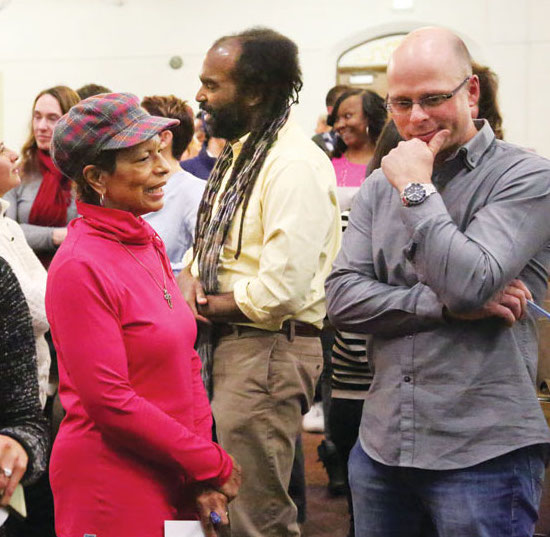 This proceeds from my previous articles outlining an approach to community-based “regime change” activism. I encourage you to read them to embrace the foundation for what follows.
This proceeds from my previous articles outlining an approach to community-based “regime change” activism. I encourage you to read them to embrace the foundation for what follows.
Part I
Part II
Part III
We put away the smart phones and let the computers go to sleep. TV and movie habits are put on hold, at least for a few hours each week. Using basic social skills we were all taught as children, engaging others face-to-face, we talk and listen to friends, neighbors, relatives, even strangers in our communities, about the problems we all individually and collectively face. We talk about what ails us. Most people love to complain. Misery loves company. Next . . .
We tactfully and respectfully navigate the discussion to those critical issues which are the direct consequence of government policy and can only be solved by our elected officials.
We find common ground. This should be easy. So much has gone wrong over the past several decades, it is almost impossible to find someone who hasn’t been negatively impacted by the mess we find ourselves in. Americans on the whole are hurting. Individually we are victims of much misguided decision-making.
We continue to talk. And most importantly . . . to listen.
Maybe this doesn’t sound like much of a breakthrough, but if we get this far — having a comfortable adult conversation about one or more specific things which are contributing to the ongoing dysfunction — it actually is quite noteworthy, taking into consideration the current environment. More typically now whenever anything appears to remotely involve politics, we expect to see folks either maniacally shouting or withdrawing into a coma-like state of mute detachment.
Talking and listening thoughtfully and graciously represents dramatic progress!
So . . . where are we taking this?
Time for a refresher on the Constitution.
Congress makes laws. The president enforces them.
Granted, this clear division of labor has in recent times been compromised, with abuse of regulatory powers and signing statements by the president, and the wholesale surrender of war making powers by the Congress. Let’s still be clear. And I offer this both as a warning to the ebullient Bernie Sanders supporters, and to those anxiety-ridden progressives who live in fear of either Hillary Clinton or Donald Trump ascending the presidential throne:
Without a supportive Congress, nothing positive — or for that matter negative — will get done, especially if the new president is isolated. It will be animus, gridlock, confrontation, blame-gaming, a show of distrust and open hostility between the executive and legislative branches, which will make the past decade look like a friendly game of flag football. This would certainly be the case with either Trump or Sanders. Perhaps the most frightening prospect is a Hillary presidency, since her most menacing and treacherous policies, both domestic and international, presently have widespread support by our current corrupt, corporate-owned legislature.
There is no question that a strong, visionary president would be a good thing.
But a responsible, responsive, representative people’s Congress is absolutely crucial.
Strong, visionary congressional action is a matter of survival for our nation.
Nothing will change until we change the laws.
Laws won’t change until we change the law makers.
This is exactly where our grass-roots, boots-on-the-ground, community-based campaign must be entirely focused.
It is about electing individuals to Congress, both the House of Representatives and Senate, who will be directly accountable to their constituents. The immediate goal of our efforts is to elect representatives who will pass legislation on a whole host of issues which are clearly important to voters. These are things the public wants done . . . but aren’t getting done.
This means one of two things. Either the incumbents running for office come around and do what the voting public demands. Or they are replaced with fresh candidates who have made a binding commitment to do so.
Back to our “conversation” with our neighbor, cousin, street cleaner, bartender, war vet.
We have been talking and listening. It is obvious that the person we are talking to feels passionately about one, maybe several of the key issues. Here’s what unfolds next — for each and every initiative — using Social Security here as an illustration:
 “I see you feel as strongly as I do about keeping Social Security intact and if anything improving it. Can I get you to sign this?”
“I see you feel as strongly as I do about keeping Social Security intact and if anything improving it. Can I get you to sign this?”
“What is it?”
“It’s a petition.”
“Oh great! Another petition. Those never work.”
“We think it will this time. We’re coming up with a way to force our elected officials to do what they say they’re going to do.”
“Who is we?”
“Well, ‘we’ is folks just like you and me. This isn’t a political party. It’s just citizens who want to see some important things get done. Get some serious problems solved.”
“How? Politicians say one thing and do another.”
“Exactly. That’s why we need to demand they stop playing games. People like us have to stand up for ourselves. The politicians are like children and will get away with whatever they can. So if you and I don’t take a stand, it’ll never change. We have to try. If enough of us raise enough hell, stick together and refuse to take ‘no’ for an answer, we just might pull this off.”
“How? How are you going to get these guys with all their money and powerful backers to pay attention? How can you make them do anything?”
 “First, we’re going to get 40,000 people to sign this. Look what it says. ‘I will only vote for a candidate who will protect Social Security and work to increase benefits.’ I’d say that’s pretty clear.”
“First, we’re going to get 40,000 people to sign this. Look what it says. ‘I will only vote for a candidate who will protect Social Security and work to increase benefits.’ I’d say that’s pretty clear.”
“And how will we know they will actually do this? What’s my signing a petition got to do with making my congressman get his butt in gear?”
“It’s a place to start. We will build on it to demand action. For one thing, you’re saying this is very important to you. If fact, you’re saying if he wants your vote, he had better step up to the plate.”
“And they’ll promise to do it, get elected, then break their promises.”
“This time we won’t let them.”
“Hah!”
Most people are pretty jaded and pessimistic about the possibility of moving the system. Inaction is the norm, the status quo the accepted state of things. Resignation is endemic.
Many will want to argue at this point that we’re wasting our time.
This is not an argument you can win. No one knows for sure what will work and what will not. And frankly, those skeptics have history on their side. For the average American things are going backwards. Very little is getting done, unless it benefits the rich.
At the same time, that’s not an excuse for not trying. Not trying guarantees failure.
“If we don’t try, then we’ll never get anything done. If you don’t want to see Social Security destroyed, then sign this and we’ll take it from there. It can’t hurt.”
That’s all that needs to be said for now. Here is what the petition pledge looks like:

What does a person have to lose by signing this?
Or signing similar petitions on other issues they feel strongly about?
Some might still be reluctant. They may want to know why we need signatures on the petition. If they press the matter, then explain what happens next — which is what I’ll discuss in detail in Parts V and VI of this series.
“Once we know we have enough voters behind this, we’ll demand that each candidate signs a legally-binding contract. That will be the ‘absolute commitment’ to do what you’ve asked them to do.”
“And if they refuse to sign it?”
“We don’t vote for them and we find someone who will. No contract, no vote.”
“They’re not going to like this.”
“But we will. And we’ll get something done for a change that we want done.”
This idea is so simple, yet so powerful. But there’s only one way it can work . . .
 People must unite not under party banners, but as a voting bloc around issues that are important to them. Party labels — also very much the case with ideological labels — muddy the waters, get people unfocused on what’s truly consequential. ‘Democrat’, ‘Republican’, ‘liberal’, ‘conservative’, ‘libertarian’ — even more so with ‘socialist’, ‘Tea Party’, and ‘Green Party’ — have now become so emotionally charged, clear thinking becomes difficult, constructive dialogue impossible.
People must unite not under party banners, but as a voting bloc around issues that are important to them. Party labels — also very much the case with ideological labels — muddy the waters, get people unfocused on what’s truly consequential. ‘Democrat’, ‘Republican’, ‘liberal’, ‘conservative’, ‘libertarian’ — even more so with ‘socialist’, ‘Tea Party’, and ‘Green Party’ — have now become so emotionally charged, clear thinking becomes difficult, constructive dialogue impossible.
Forget the labels, affiliations, philosophies. Stick with the issues. They’re staring us right in the face.
I hate sounding like a broken record, but please look again at the issue polls cited in my previous two articles:
75% of Americans want a federal minimum wage of $12.50 per hour.
63% of Americans want a federal minimum wage of $15.00 per hour.
75% of voters want fair trade agreements protecting jobs, workers, the environment.
76% of voters want a cut back on military spending.
76% of voters want the U.S. completely out of Afghanistan.
79% of voters want no reductions in Social Security, 70% support expanding it.
79% of voters want no reductions in Medicare.
80% of voters oppose the “Citizens United” U.S. Supreme Court decision.
68% of voters think taxes on the wealthy should be increased.
71% of voters support massive infrastructure renewal.
65% of voters want laws to combat climate change.
62% of voters want tuition free public colleges and universities.
74% of American voters are for ending oil industry subsidies.
93% of voters want GMO labeling on their food.
These are huge consensuses. These are the big issues. To set the stage for real reform, to get our future elected officials listening, these are the issues which draw a line in the sand. Either the candidates commit to getting these things done or they simply don’t get elected. Period!
This is how we force candidates to pay attention.
Why will they pay attention?
Their jobs depend on it.




Putting Boots (Birkenstocks) on the Ground: Part IV
Part I
Part II
Part III
We put away the smart phones and let the computers go to sleep. TV and movie habits are put on hold, at least for a few hours each week. Using basic social skills we were all taught as children, engaging others face-to-face, we talk and listen to friends, neighbors, relatives, even strangers in our communities, about the problems we all individually and collectively face. We talk about what ails us. Most people love to complain. Misery loves company. Next . . .
We tactfully and respectfully navigate the discussion to those critical issues which are the direct consequence of government policy and can only be solved by our elected officials.
We find common ground. This should be easy. So much has gone wrong over the past several decades, it is almost impossible to find someone who hasn’t been negatively impacted by the mess we find ourselves in. Americans on the whole are hurting. Individually we are victims of much misguided decision-making.
We continue to talk. And most importantly . . . to listen.
Maybe this doesn’t sound like much of a breakthrough, but if we get this far — having a comfortable adult conversation about one or more specific things which are contributing to the ongoing dysfunction — it actually is quite noteworthy, taking into consideration the current environment. More typically now whenever anything appears to remotely involve politics, we expect to see folks either maniacally shouting or withdrawing into a coma-like state of mute detachment.
Talking and listening thoughtfully and graciously represents dramatic progress!
So . . . where are we taking this?
Time for a refresher on the Constitution.
Congress makes laws. The president enforces them.
Granted, this clear division of labor has in recent times been compromised, with abuse of regulatory powers and signing statements by the president, and the wholesale surrender of war making powers by the Congress. Let’s still be clear. And I offer this both as a warning to the ebullient Bernie Sanders supporters, and to those anxiety-ridden progressives who live in fear of either Hillary Clinton or Donald Trump ascending the presidential throne:
Without a supportive Congress, nothing positive — or for that matter negative — will get done, especially if the new president is isolated. It will be animus, gridlock, confrontation, blame-gaming, a show of distrust and open hostility between the executive and legislative branches, which will make the past decade look like a friendly game of flag football. This would certainly be the case with either Trump or Sanders. Perhaps the most frightening prospect is a Hillary presidency, since her most menacing and treacherous policies, both domestic and international, presently have widespread support by our current corrupt, corporate-owned legislature.
There is no question that a strong, visionary president would be a good thing.
But a responsible, responsive, representative people’s Congress is absolutely crucial.
Strong, visionary congressional action is a matter of survival for our nation.
Nothing will change until we change the laws.
Laws won’t change until we change the law makers.
This is exactly where our grass-roots, boots-on-the-ground, community-based campaign must be entirely focused.
It is about electing individuals to Congress, both the House of Representatives and Senate, who will be directly accountable to their constituents. The immediate goal of our efforts is to elect representatives who will pass legislation on a whole host of issues which are clearly important to voters. These are things the public wants done . . . but aren’t getting done.
This means one of two things. Either the incumbents running for office come around and do what the voting public demands. Or they are replaced with fresh candidates who have made a binding commitment to do so.
Back to our “conversation” with our neighbor, cousin, street cleaner, bartender, war vet.
We have been talking and listening. It is obvious that the person we are talking to feels passionately about one, maybe several of the key issues. Here’s what unfolds next — for each and every initiative — using Social Security here as an illustration:
“What is it?”
“It’s a petition.”
“Oh great! Another petition. Those never work.”
“We think it will this time. We’re coming up with a way to force our elected officials to do what they say they’re going to do.”
“Who is we?”
“Well, ‘we’ is folks just like you and me. This isn’t a political party. It’s just citizens who want to see some important things get done. Get some serious problems solved.”
“How? Politicians say one thing and do another.”
“Exactly. That’s why we need to demand they stop playing games. People like us have to stand up for ourselves. The politicians are like children and will get away with whatever they can. So if you and I don’t take a stand, it’ll never change. We have to try. If enough of us raise enough hell, stick together and refuse to take ‘no’ for an answer, we just might pull this off.”
“How? How are you going to get these guys with all their money and powerful backers to pay attention? How can you make them do anything?”
“And how will we know they will actually do this? What’s my signing a petition got to do with making my congressman get his butt in gear?”
“It’s a place to start. We will build on it to demand action. For one thing, you’re saying this is very important to you. If fact, you’re saying if he wants your vote, he had better step up to the plate.”
“And they’ll promise to do it, get elected, then break their promises.”
“This time we won’t let them.”
“Hah!”
Most people are pretty jaded and pessimistic about the possibility of moving the system. Inaction is the norm, the status quo the accepted state of things. Resignation is endemic.
Many will want to argue at this point that we’re wasting our time.
This is not an argument you can win. No one knows for sure what will work and what will not. And frankly, those skeptics have history on their side. For the average American things are going backwards. Very little is getting done, unless it benefits the rich.
At the same time, that’s not an excuse for not trying. Not trying guarantees failure.
“If we don’t try, then we’ll never get anything done. If you don’t want to see Social Security destroyed, then sign this and we’ll take it from there. It can’t hurt.”
That’s all that needs to be said for now. Here is what the petition pledge looks like:
What does a person have to lose by signing this?
Or signing similar petitions on other issues they feel strongly about?
Some might still be reluctant. They may want to know why we need signatures on the petition. If they press the matter, then explain what happens next — which is what I’ll discuss in detail in Parts V and VI of this series.
“Once we know we have enough voters behind this, we’ll demand that each candidate signs a legally-binding contract. That will be the ‘absolute commitment’ to do what you’ve asked them to do.”
“And if they refuse to sign it?”
“We don’t vote for them and we find someone who will. No contract, no vote.”
“They’re not going to like this.”
“But we will. And we’ll get something done for a change that we want done.”
This idea is so simple, yet so powerful. But there’s only one way it can work . . .
Forget the labels, affiliations, philosophies. Stick with the issues. They’re staring us right in the face.
I hate sounding like a broken record, but please look again at the issue polls cited in my previous two articles:
75% of Americans want a federal minimum wage of $12.50 per hour.
63% of Americans want a federal minimum wage of $15.00 per hour.
75% of voters want fair trade agreements protecting jobs, workers, the environment.
76% of voters want a cut back on military spending.
76% of voters want the U.S. completely out of Afghanistan.
79% of voters want no reductions in Social Security, 70% support expanding it.
79% of voters want no reductions in Medicare.
80% of voters oppose the “Citizens United” U.S. Supreme Court decision.
68% of voters think taxes on the wealthy should be increased.
71% of voters support massive infrastructure renewal.
65% of voters want laws to combat climate change.
62% of voters want tuition free public colleges and universities.
74% of American voters are for ending oil industry subsidies.
93% of voters want GMO labeling on their food.
These are huge consensuses. These are the big issues. To set the stage for real reform, to get our future elected officials listening, these are the issues which draw a line in the sand. Either the candidates commit to getting these things done or they simply don’t get elected. Period!
This is how we force candidates to pay attention.
Why will they pay attention?
Their jobs depend on it.